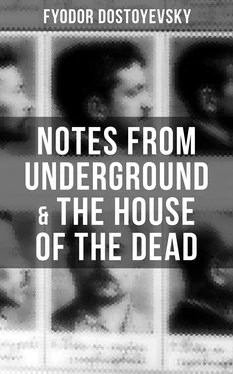Mikhailoff strikes up a conversation with Suchiloff; they suit one another, and are soon on friendly terms. Finally, at some station, Mikhailoff makes his comrade drunk, and then asks him to exchange.
‘My name is Mikhailoff,’ he says, ‘I’m condemned to hard labour but in my case it will be nothing of the kind, as I am to enter a particular special section. I’m classed with the hard-labour men, but in this special division the work is not so severe.’
Before the special section was abolished many persons, even in the official world of St Petersburg, were unaware of its existence. It was stationed in some remote corner of one of the most distant regions of Siberia, and one was unlikely to hear much about it. It was insignificant, moreover, on account of its limited numbers, which in my time did not exceed seventy. I have since met men who have served in Siberia and know the country well, and yet have never heard of the ‘special section.’ In the rules and regulations there are only six lines about this institution.
Now, attached to the convict establishment at is a special section reserved for the most dangerous criminals, and where the severest forms of labour await them. The prisoners themselves know nothing of this section. Was it a temporary or permanent institution? Neither Suchiloff nor any of his companions, nor Mikhailoff himself even can guess the significance of those two words. Mikhailoff, however, has his suspicions as to the true character of the section: from the gravity of the crime for which he is forced to march three or four thousand versts on foot. It is certain he is on his way to no soft spot. Suchiloff, on the other hand, is to be a colonist, and what could Mikhailoff desire better than that?
‘ Won’t you exchange? ‘ he asks. Suchiloff is a little drunk, he is a simple-minded man, full of gratitude to the comrade who entertains him, and dare not refuse; he has heard, moreover, from other prisoners, that these exchanges are made, and understands, therefore, that there is nothing extraordinary or outlandish in the proposition made to him. An agreement is reached: the cunning Mikhailoff, profiting by Suchiloff’s simplicity, buys his name for a red shirt and a silver rouble which are handed over before witnesses. Next day Suchiloff is sober, but he is given more liquor; he drinks up his own rouble, and after a while the red shirt suffers the same fate.
‘If you don’t like the bargain we made, give me back my money,’ says Mikhailoff. But where is Suchiloff to get a rouble? If he does not give it back, the convicts’ association will force him to keep his promise. The prisoners are most sensitive on such points; he must carry out his obligations. The association requires it, and in case of disobedience woe to the offender! He will be killed, or at least seriously intimidated. Indeed, if the association once showed mercy to men who had broken their word, it would cease to exist. if a promise can be revoked, and a contract voided after the stipulated sum has been paid, who would be bound by such an agreement? It is a question of life or death for the association, and prisoners in consequence adhere strictly to the rule.
Suchiloff accordingly finds it impossible to with draw, that nothing can save him, and he therefore agrees to all that is required of him. The bargain is then made known to the whole convoy, and if denunciation is feared those whose loyalty is suspect are liberally treated. In any case, what does it matter to others whether Mikhailoff or Suchiloff goes to the devil? They have had free drinks, they have been entertained without cost to themselves, and none reveals the secret.
At the next station there is a roll-call. When Mikhailoff’s name is called, Suchiloff answers ‘Present,’ Mikhailoff does the same for Suchiloff, and the journey is continued. The matter is now as good as forgotten. At Tobolsk the convoy breaks up: Mikhailoff becomes a colonist, while Suchiloff is sent to the special section under double escort. It would be useless now to cry out and protest. What proof would there be? It would take years to decide the case, and what benefit would the complainant derive? Where, moreover, are the witnesses? They would deny everything, even if they could be found.
This is how Suchiloff, for a silver rouble and a red shirt, landed up in the special section. He was a laughingstock, not because he had exchanged-though in general the convicts despised a man who had been foolish enough to exchange an easy task for a harder one-but simply because he had received nothing for the bargain except a red shirt and a rouble, which was certainly a ridiculous consideration.
As a rule those exchanges were made for relatively large sums: several ten-rouble notes sometimes changed hands. But Suchiloff was so devoid of character, so insignificant, such a perfect nonentity, that one could scarcely even laugh at him. He and I had lived a considerable time together, I had grown accustomed to him, and he had formed an attachment for me, when one day-I can never forgive myself for what I did-he failed to carry out an order. When he came to ask for his money I had the cruelty to say: ‘You don’t forget to ask for your money, but you don’t do what you’re told.’ Suchiloff remained silent and hastened to do as he was bid, but he suddenly became very sad. Two days passed, and I could scarcely believe that my remark had affected him so deeply. I knew that someone named Vassilieff was constantly dunning him for a small debt; he was probably short of money, and dared not ask me for any.
‘ Suchiloff,’ I said, ‘you’re in need of cash, to pay Vassilieff. Take this.’
I was seated on my camp-bedstead. Suchiloff remained standing before me, amazed that I had myself proposed giving him money, and that I had remembered his difficult position; the more so as he had recently on several occasions asked me to advance him money, and scarcely hoped that I would oblige him once again. He stared at the paper I held out to him, then looked at me, turned sharply on his heel, and went out. Astonished at his behaviour, I followed, and discovered him behind the barrack. He was standing with his head against the palisade and his arms resting on the stakes.
‘What’s the matter, Suchiloff?’ I asked.
He made no reply, and to my great surprise I saw that he was on the verge of tears.
‘You think, Alexander Petrovitch,’ he said, in a trembling voice and trying not to look at me, ‘that I care only for your money, but I’
He turned away from me, laid his forehead against the palisade, and began to sob. It was the first time I had seen a man weep in prison. I had much trouble consoling him, and thenceforward he served me, if possible, more diligently than ever. He was always on the alert for my orders, but by almost imperceptible signs I could tell that in his heart he would never forgive my reproach. The others continued to laugh at him, pull his leg, and even insult him at every opportunity. But he never lost his temper; on the contrary, he remained on good terms with all. It is indeed difficult really to know a man, even when you have lived with him for years.
It was some time before I began to understand the significance of prison life. Although I kept my eyes open I did not at first appreciate a number of facts that stared me in the face: I was looking at them from the wrong angle, and the only impression I received was one of unmitigated gloom. What contributed more than anything else to this view was
my meeting with Af, a convict who had entered the prison
before me, and whose character had shocked me in those first few days. His baseness increased my mental suffering, which was already sufficiently acute. He offered the most repulsive example of that degradation to which a man may fall when all feeling of honour has died within him. This young man of noble birth-I have spoken of him before-used to inform the governor, through his servant Fedka, of everything that went on in barracks. Here is the man’s history.
Читать дальше












